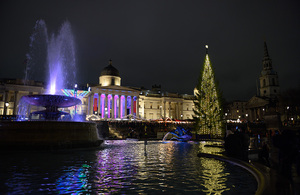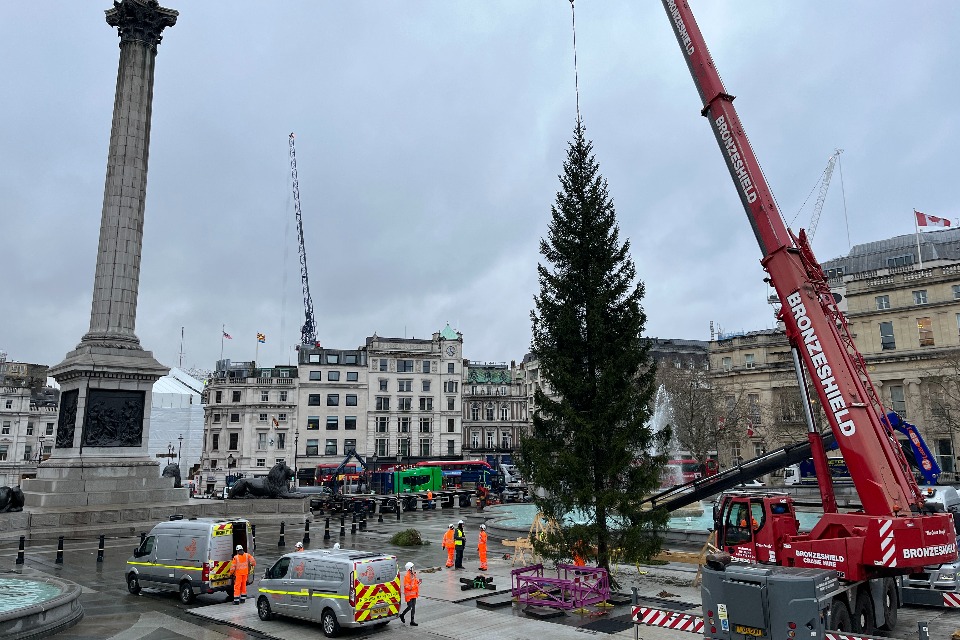Celebrating the Seas-on of Christmas
Maritime sector working round the clock since September to deliver Christmas to households across the UK.

The world-famous Trafalgar Square Christmas tree.
- from toys to tinsel – the maritime industry works day and night to make Christmas what it is
- seafarers, harbourmasters and other staff at ports will work over the festive period to ensure presents, food and crucial goods get to millions of people across the country
- September is the busiest month for the arrival of Christmas decorations into UK ports by container
While the maritime sector is a cornerstone of the UK economy year-round, its significance escalates during the Christmas season. As much of the country gets ready for a break from work, the maritime sector remains in full swing, with vessels arriving at UK ports even on Christmas Day.
Given that 95% of trade volume reaches the UK by sea, it’s no surprise that a considerable share of Christmas merchandise, including gifts, decorations and Christmas trees, is imported. The maritime sector plays a crucial role in ensuring its timely arrival by orchestrating the transportation and logistics of shipments from international suppliers.
Strategic planning is required to deliver the logistical challenge that comes with the festive period. According to analysis by the Department for Transport (DfT), September is the busiest month for the arrival of Christmas decorations into UK ports by container, making their way into shops in good time for Christmas.
Lord Davies, Maritime Minister, said:
As we approach the festive season, I would like to express my gratitude to those sacrificing time with their friends and family – particularly those who are away at sea or working at ports.
Every year, the maritime sector ensures that stockings are full, gifts are wrapped and the holiday spirit sails smoothly into every household across the UK. Their ceaseless commitment ensures the festive season is truly special.
Ports are at their peak in the run-up to Christmas, with the Port of Dover handling twice as much freight and tourist traffic as normal. This often means longer working hours for seafarers and staff over the festive season to ensure operations and journeys run smoothly.
Doug Bannister, Chief Executive at Port of Dover, said:
We’d like to thank all our people, the ferry operators and the lorry drivers who, after making sure everyone else has what they need, will be driving home for Christmas to be with their loved ones. And we wish those travelling overseas to be with friends and relatives happy holidays.
According to HMRC data, the Port of Immingham also imported a staggering £7.3 million worth of fresh Christmas trees last year. This not only highlights the scale of operations but also emphasises the critical role that ports play in the Christmas narrative.
While every Christmas tree is special, there’s one that is a yearly spectacle in the UK’s capital. The world-famous Trafalgar Square Christmas tree, sitting at 62 feet this year, was imported through the Port of Immingham earlier this month. As a symbol of friendship and gratitude for the support provided during the Second World War, Norway gifts the UK a tree every year – with this year marking the 76th anniversary of the tradition.

The Trafalgar Square Christmas tree arriving from Norway
Simon Bird, Regional Director at Associated British Ports (ABP) for the Humber ports, said:
It’s been a very long tradition that every year the Trafalgar Square Christmas tree arrives in the Port of Immingham.
Our tenant DFDS has transported this gift for more than 25 years. It’s a great privilege that this symbol of peace from Norway travels through the Humber on its journey to London. We hope this tradition continues. You feel Christmas has started when you know it’s on its way.
In November, the tree was cut down by The Lord Mayor of Westminster Councillor Patricia McAllister and The Mayor of Oslo Anne Lindboe during a felling ceremony.
None of this would be possible without the hard work and dedication of seafarers, delivering our Christmas presents after weeks, sometimes months, at sea. DfT has implemented a comprehensive programme to support seafarers, working with the sector to improve safety, skills and welfare through the Seafarers’ Charter and the Seafarers’ Wages Act.
Ports are also vital to the sector’s future, which is why DfT is currently reviewing the National Policy Statement for Ports – to support their development.
On top of this, the government has allocated £206 million to the UK Shipping Office for Reducing Emissions (UK SHORE) to decarbonise shipping. This is the biggest ever government investment to accelerate the technological advancement necessary to decarbonise our domestic maritime sector.
The government will also publish the refreshed Clean Maritime Plan as soon as possible, to deliver an ambitious, action-focused plan to accelerate maritime decarbonisation and reduce the sector’s environmental impact.
Aviation, Europe and technology media enquiries
Media enquiries 0300 7777 878
Switchboard 0300 330 3000